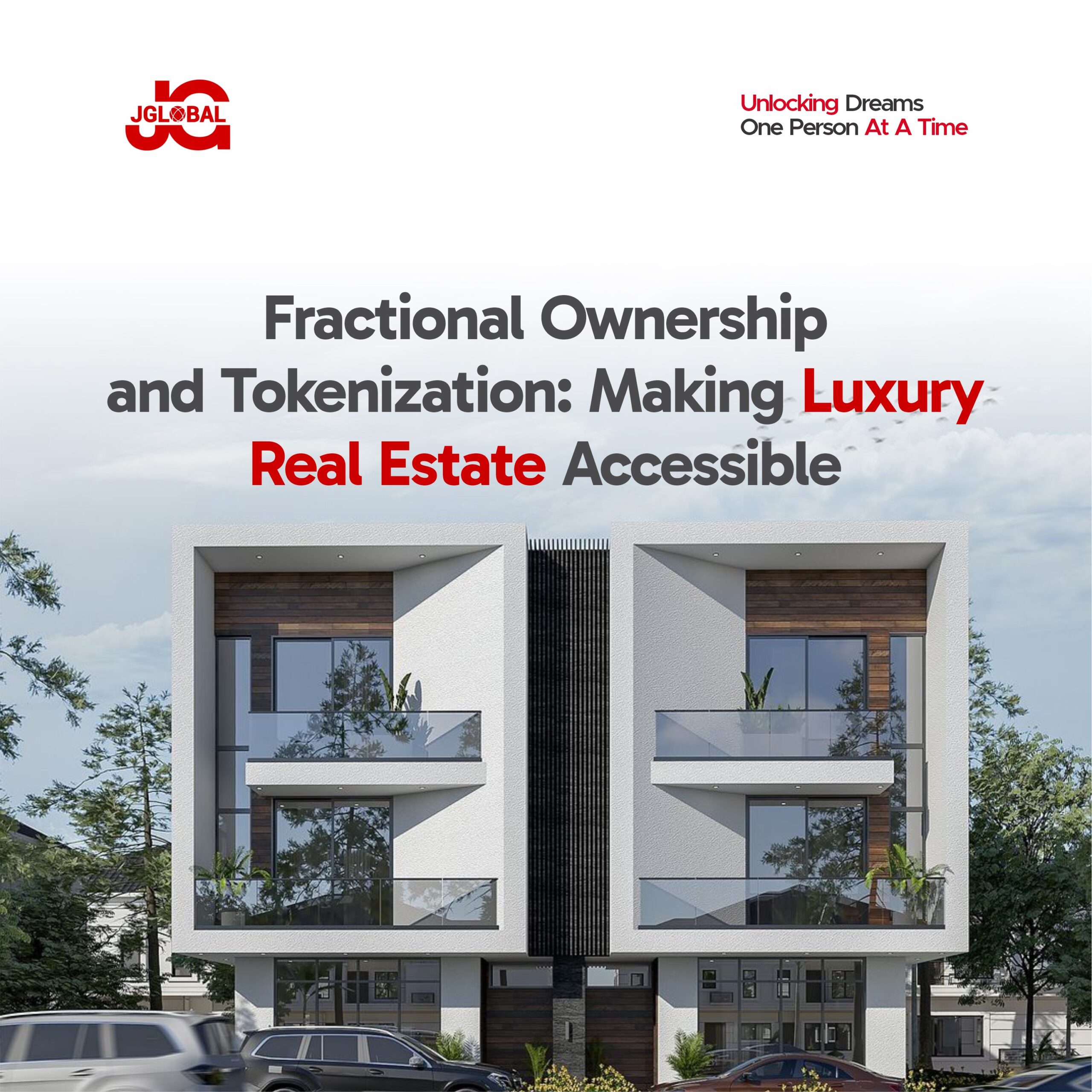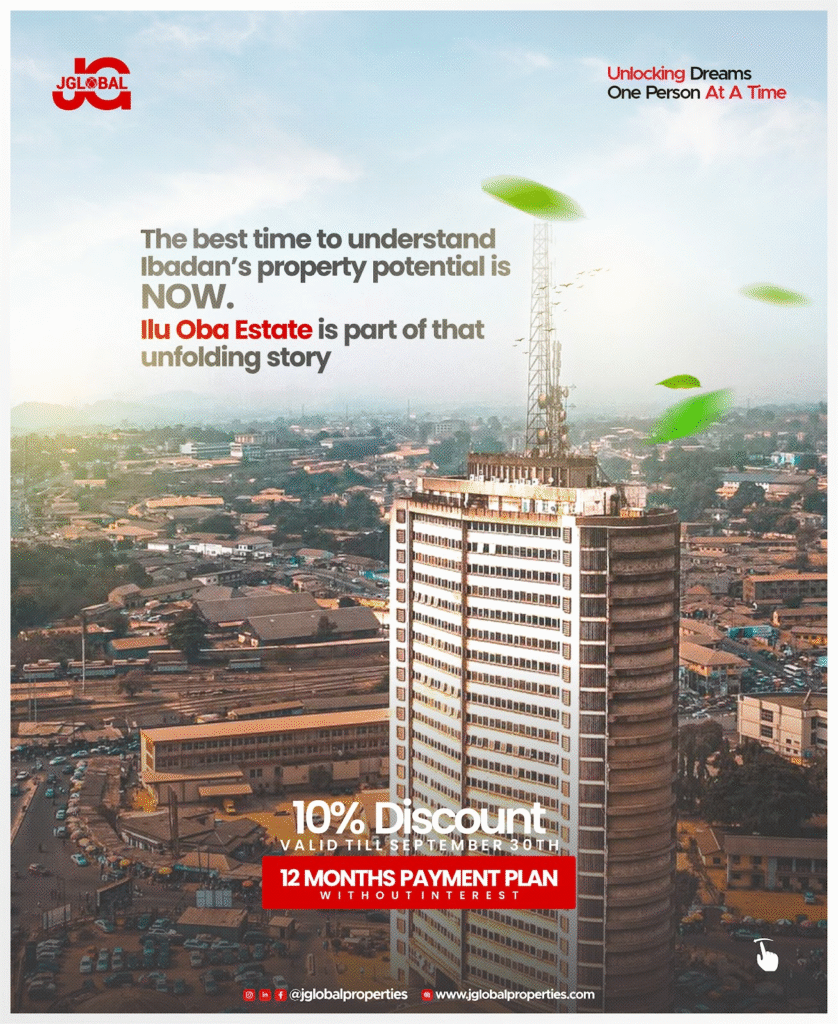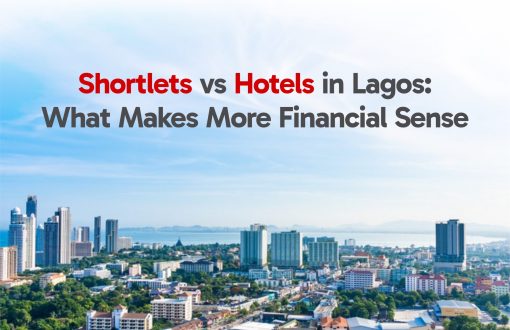Fractional Ownership and Tokenization: Making Luxury Real Estate Accessible

Introduction
For decades, luxury real estate has been a sector reserved for the wealthy. From high-rise apartments in Lagos to beachfront properties in Lekki and luxury office complexes in Abuja, the entry barrier has always been high. Traditional real estate investment often requires millions in upfront capital, making it nearly impossible for the average investor to participate.
Today, that reality is changing. With the rise of fractional ownership and real estate tokenization, everyday investors now have the opportunity to own a share of high-value properties without needing to buy them outright. These innovative models are breaking down financial barriers and creating new pathways to real estate wealth.
What is Fractional Ownership in Real Estate?
Fractional ownership refers to a structure where multiple investors share ownership of a property. Instead of one person purchasing a luxury apartment or commercial property, the cost is divided among several people.
For example:
- A luxury apartment in Victoria Island valued at ₦700 million can be shared among 20 investors.
- Each investor contributes ₦35 million, securing a 5% ownership stake.
- Rental income and appreciation are shared based on the percentage of ownership.
Fractional ownership makes it possible for middle-income earners and smaller investors to access premium real estate opportunities that were once out of reach. It also reduces individual risk by spreading financial exposure among several stakeholders.
What is Real Estate Tokenization?
While fractional ownership has existed for some time, tokenization is a newer and more advanced model powered by blockchain technology.
Tokenization involves converting real estate assets into digital tokens. Each token represents a share of ownership in the property. Just like company shares are traded on the stock market, these digital tokens can be bought, sold, or transferred between investors.
For instance:
- A commercial property in Abuja worth ₦1 billion can be divided into 1,000,000 tokens.
- An investor can purchase 10,000 tokens worth ₦10 million, which equals 1% ownership of the property.
- These tokens can later be sold or traded on digital platforms, giving investors more flexibility and liquidity compared to traditional property ownership.
Tokenization brings transparency since all transactions are recorded on blockchain, and it offers easier access to international investors who may want to participate in Nigerian real estate markets without being physically present.
Read more:
Lagos Suburbs to buy land now before prices explode
How to report scam using the new housing fraud portal

Key Facts & Data (Nigeria & Global Context)
| Area | Fact / Data |
| Low adoption in Nigeria so far | Experts say real estate tokenization is still “low in Nigeria” because of low awareness, lack of regulation, and traditional legal systems unfamiliar with digital ownership forms. |
| Global size and growth | Real estate tokens globally are growing; tokenized real estate is part of the broader digital securities market. |
| Case: Lagos State plan | Lagos State Government plans to tokenise real estate using blockchain/NFTs, with a ₦500 million budget and an expected 16-month timeline. |
| Legal / regulatory status | According to Pavestones Legal, although tokens may represent beneficial or contractual interests, current Nigerian land law does not yet recognize tokens as replacing traditional title documents. That means legal ownership via tokenization is symbolic unless legal reform occurs. |
| Regulation of virtual assets | The Investments and Securities Act (ISA) 2025 in Nigeria provides for classification of virtual tokens as securities, meaning platforms offering tokenised real estate must comply with regulations (e.g. disclosure, KYC, AML). |
| Challenges in practice | A study on Abuja found that while fractional ownership’s advantages (lower capital, diversification, access) are well understood by developers, its adoption is low due to legal uncertainties, limited market awareness, coordination challenges, and issues around profitability. |
How Tokenization Typically Works
Here is how Tokenization works:
- Selection & Due Diligence: Property is selected, title ownership and physical status reviewed, valuations done.
- Legal Structuring: The property might be put into a legal entity (like a trust, company, or special purpose vehicle) to enable fractional ownership. Contracts must define ownership rights, income sharing, etc.
- Token Creation: Digital tokens are defined; could be fungible tokens (many identical tokens representing parts of one property) or non-fungible tokens (NFTs) if treating a whole property or distinguishing units.
- Smart Contracts Deployment: The rules (e.g. how rental income or profits are distributed, what happens on resale) are coded in smart contracts on blockchain — this ensures automation, transparency, and enforceability.
- Investor Onboarding & Trading: Investors are verified (KYC/AML), tokens are offered; often there is secondary trading to allow buying/selling of tokens; token-owners get income or benefit via digital payments.
Benefits of Tokenization and Fractional Ownership in Real Estate
- Lower Entry Costs: Investors don’t need to pay full price for an entire luxury property. Smaller sums can give access to high-value real estate.
- Greater Liquidity: Tokenized shares can be traded more easily than entire properties which typically take long to sell.
- Transparency & Security: Blockchain provides immutable records of ownership, transaction history; reduces fraud risk.
- Access to Premium Assets: Investors can get exposure to luxury or high-growth property markets (e.g. Lagos, Abuja) that would otherwise be unaffordable.
Challenges & Risks of Tokenization and Fractional Ownership in Real Estate.
- Regulatory & Legal Uncertainty: Current Nigerian law does not fully recognize tokens as legal title to land; title documents (Land Use Act, Governor’s consent) are still required.
- Awareness & Education: Many potential investors, developers, and legal authorities are not fully aware of how tokenization works or the risks.
- Trust & Fraud Risks: Potential for scams (fake tokens, misrepresented property status), loss of private keys, etc.
- Infrastructure & Tech Limitations: Reliable internet, blockchain platforms, secure digital identity are not always available or efficient.
- Valuation, Tax & Transfer Issues: How to value tokens, how taxes apply, how ownership passes on death or sale, how to integrate with land registry systems.
What’s Happening in Nigeria Right Now
- Lagos State is planning tokenization of real estate to improve internally generated revenue. Part of the plan involves issuing NFTs to represent property and making transactions more transparent.
- The ISA 2025 is a step towards regulating digital/virtual assets, including virtual tokens, which is relevant for tokenized real estate platforms.
- Studies in Abuja show that while developers recognize potential, fractional ownership remains rare due to legal, regulatory, and market awareness constraints.
Conclusion
Fractional ownership and tokenization hold real promise for making luxury real estate in Nigeria (and globally) more accessible. When investors are properly informed and protected, they can benefit from lower entry costs, greater liquidity, and access to premium assets. However, many challenges remain: the legal and regulatory framework must evolve; infrastructure and awareness need to grow; trust and transparency must be ensured.
For those interested in participating: do your due diligence. Check if tokenized platforms you use are compliant with ISA, KYC, AML rules; verify property titles; understand what you own (ownership contract vs beneficial interest vs legal title). As regulation improves and technology solidifies, fractional ownership and tokenization can shift from niche experiment to mainstream mode of property investment.



